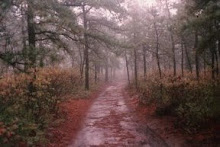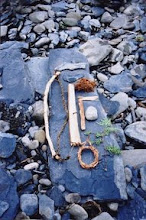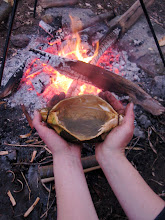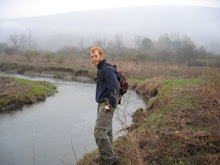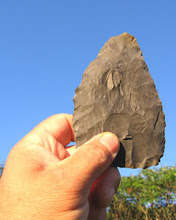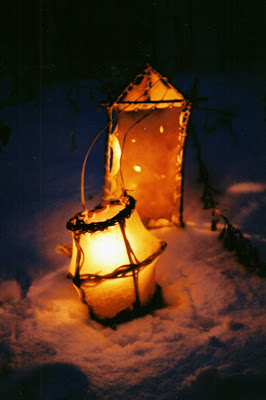
Most of you who are reading this blog are committed in many ways to learning earth skills, to getting closer to nature, to finding your vision and walking a strong path. I would bet that all of you are passionate about learning and growing, too.
At Hawk Circle, I haven't really pushed the whole 'Passion and Commitment' thing, because I think it can be overused. I think people can beat themselves up over going out to dinner rather than staying home and making acorns. I have seen students become almost immobilized by their worry that they aren't passionate enough. Or committed. Have you seen this?
I guess the bottom line is, for me, anyway, that I don't want someone to feel bad about themselves. I don't think that is the way we are going to really learn our skills. Or atleast, it shouldn't be that way. Because it just doesn't feel good. And if you start to associate not feeling good with wilderness skills, or getting outside, then it is a bad trend.
Guilt trips don't really work. Boot camp doesn't really work, long term. What I have seen work is being inspired. Connecting with that spark that comes from sweet discovery of a new track, or finding an awesome new berry, or making a superb bow. Hearing a story about how native people lived can be inspiring. Hearing stories about one of your friend's camping trips, or newly learned skills, definitely is inspiring!
When I am feeling low, or flat, and I don't feel like I am all that passionate, I do a couple of things. I go visit people I know who are passionate. Like Michael McCarthy, the artist/blacksmith/gardener...(the list goes on and on) and just being around him gets me excited to work on something, anything, again. Or hanging around with Barry Keegan, making any number of crafts. Or just hanging out in the barn with our students, who are always working on a ton of different things.
If no one is around, I will pull a book down that particularly spoke to me, like Barry Lopez's "River Notes" or Ed Abbey's "Desert Solitaire". Rereading certain passages definitely lights a fire under me, and gets me in the right mindset or mood. It just takes a little 'shot' and off I go....
Commitment is just a larger part of this. It says, "Don't give up!" even after I have just blown off a weekend to have down time with the kids. With commitment, it helps to have a long range view rather than looking at every little bump in the road, and to just give yourself a break.
As Carey Odes once said "It's not like the earth got screwed up in a day, or a week or a year. It has been happening for generations, even hundreds of years. We aren't going to say, 'Hey, the earth will all be perfect on Friday. Now what are we going to do next week?'. It just isn't going to happen like that. So everyone just settle down!"
Carey is pretty funny, but he does make a good point. We all need to settle down, and just be committed for the long haul. Recognize that it takes all of us a long time to make effective, real change, and that we will get there sooner by being inspired and loving ourselves, rather than beating ourselves up or feeling guilty.
Okay, I wish that I could magically wave a stick and everyone would change and be passionate instantly, but in the long run, we need to take care of ourselves, and do our best and take it day by day.
Another bit of good advice is something John Stokes, of the Tracking Project, in New Mexico once told me when I was learning my own skills. He said "Just try to practice one thing, a small thing, each day, and you will find that knowledge growing larger and larger, rather than pushing to do everything all at once. It just takes one or two small things to add up fast."
I listened to his words and I started to make a fire with a bow drill, every day. Just one fire, and in six months, I was starting to learn something about fire! I made fire with cedar, with sycamore, with milkweed bowstrings, with cottonwood, willow, alder and elderberry. It was an awesome time and I learned a lot.
That advice is definitely something I am happy to pass on.
Let me know if this helps!

